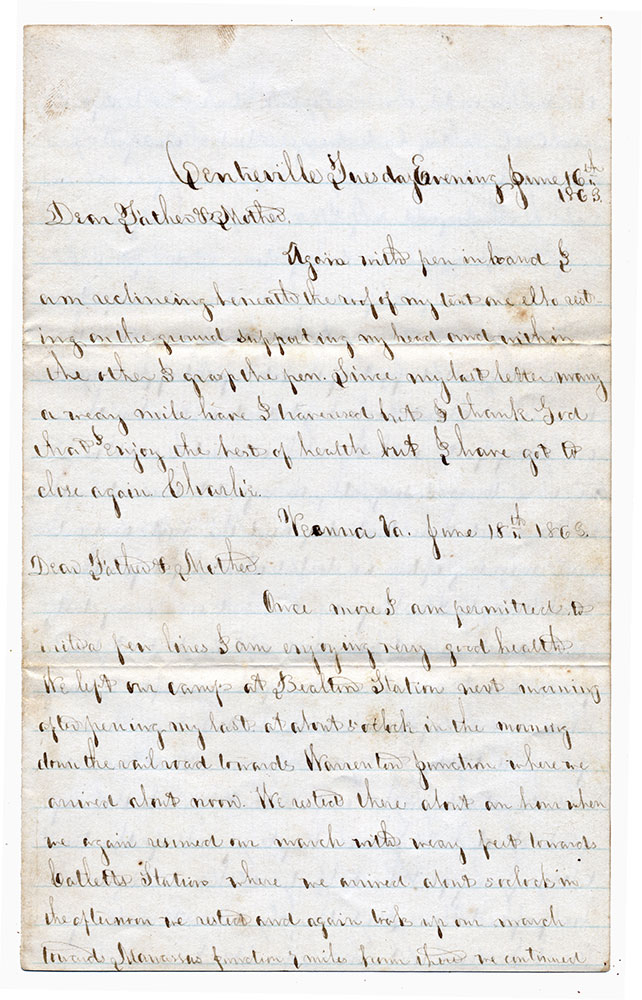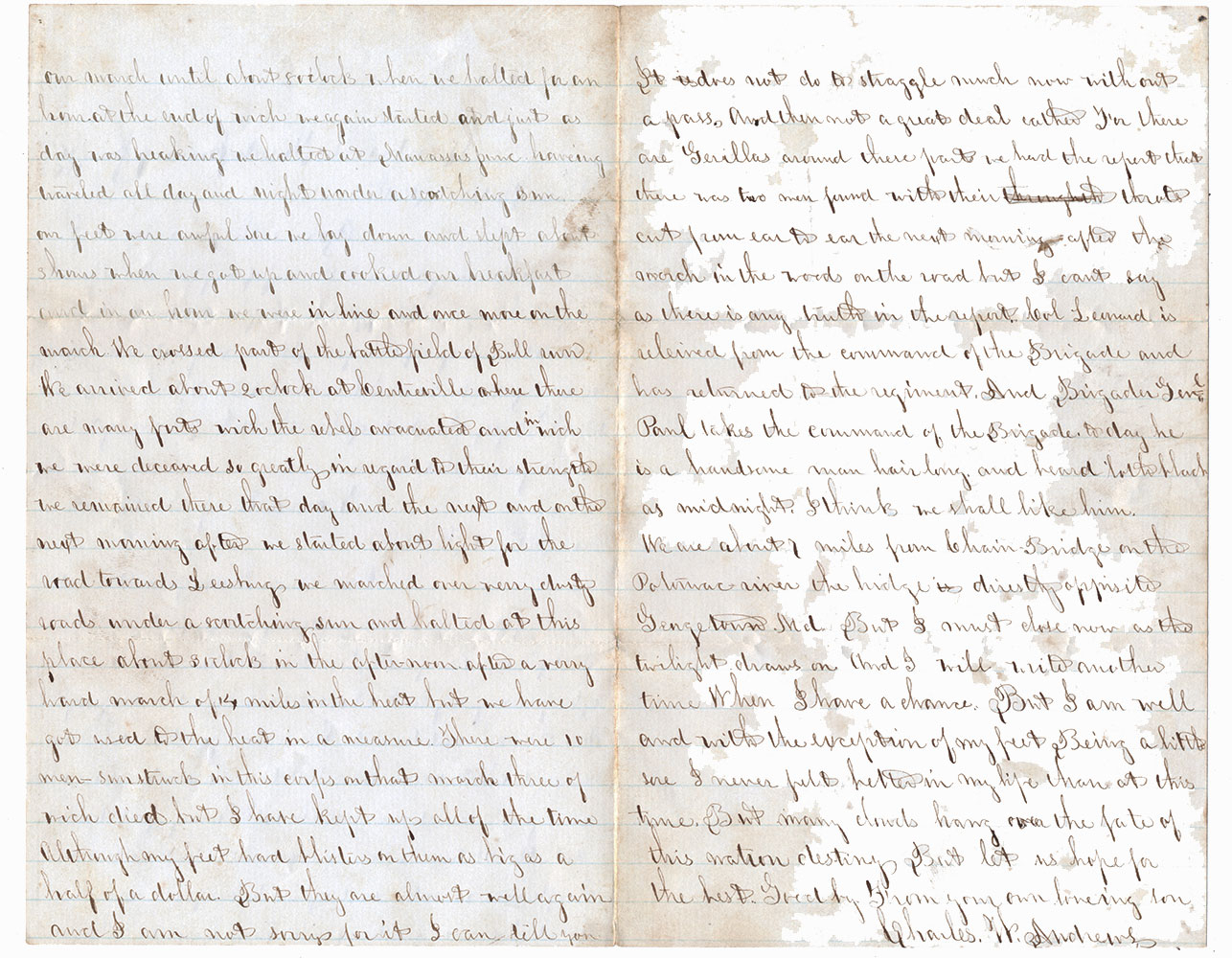site search
online catalog
GETTYSBURG CAMPAIGN SOLDIER LETTER – PVT. CHARLES W. ANDREWS, 13th MASSACHUSETTS INFANTRY, MORTALLY WOUNDED ON JULY 1, 1863

Hover to zoom


$450.00 SOLD
Quantity Available: None
Item Code: 2024-1592
This three page letter is written in ink and dated “Centreville Tuesday Evening June 16th 1863”, and “Vienna Va June 18th 1863” and directed to his parents. Overall very good condition and completely legible. Andrews began his letter on the 16th but for an unnamed reason had to close after writing just one paragraph, picking up again on the 18th. Text is as follows:
Dear Father and Mother,
Again with pen in hand and arm reclining beneath the roof of my tent one elbow resting on the ground supporting my head and within the other I grasp the pen. Since my last letter many a wear mile have I traversed but I thank God that I enjoy the best of health but I have to go to close again, Charlies
Vienna Va. June 18th 1863
Dear Father and Mother,
Once more I am permitted to write a few lines. I am enjoying very good health. We left our camp at Bealton Station next morning after penning my last about 5 o’clock in the morning down the railroad towards Warrenton Junction where we arrived about noon. We rested there about an hour when we again resumed our march with weary feet towards Catlett’s Station where we arrived about 5 o’clock in the afternoon. We rested and again took up our march toward Manassas Junction 7 miles from where we continued until about 8 o’clock when we halted for an hour at the end of which we again started just as day was breaking we halted at Manassas Junction having traveled all day and night under a scorching sun. our feet were awful sore. We lay down and slept about 3 hours when we got up and cooked our breakfast, and in one hour we were in line and once more on the march.
We crossed part of the Battlefield of Bull Run. We arrived about 2 o’clock at Centerville where there are many forts which the Rebels evacuated and in which we were deceived so greatly in regard to their strength. We remained there that day and the next and on the next morning after we started about light for the road towards Leesburg. We marched over very dusty roads under a scorching sun and halted at this place about 3 o’clock in the afternoon after a very hard march of about 14 miles in the heat. But we have got used to the heat in a measure. There were ten men sun struck in this corps on that march. Three of which died. But I have kept up all of the time although my feet have blisters on them as big as a half a dollar. But they are almost well again and I am not sorry for it. I can tell you it does not do to straggle much now without a pass, and then not a great deal either. There are guerrillas around these parts. We heard the report that there was two men found with their throats cut from ear to ear the next morning after the march in the woods on the road. But I can’t say as there is any truth to the report.
Col. Leonard is relieved from the command of the brigade and has returned to the regiment. And Brig. General Paul takes the command of the brigade today. He is a handsome man, hair long and beard both black as midnight. I think we shall like him.
We are about 7 miles from the Chain Bridge on the Potomac River. The bridge is directly opposite Georgetown Maryland.
But I must close now as the twilight draws on and I will write another time when I have a chance. But I am well and with the exception of my feet being a little sore I never felt better in my life than at this time. But many clouds hang over the fate of this nation[‘s] destiny. But let us hope for the best. Good by, from your loving son,
Charles W. Andrews
Charles W. Andrews, born in 1843 in Claremont, NH, appears to have possibly first enlisted on 11/5/61 and was mustered into Co. D, 30th Massachusetts Infantry. He was discharged for disability on 1/4/62. He enlisted on 7/28/62 and was mustered into Co. I, 13th Massachusetts Infantry as a Private. He was mortally wounded at Gettysburg during the fighting on Oak Hill on July 1st, receiving a gunshot wounded to the abdomen. Records indicate he died at a regimental field hospital.
The 13th Massachusetts was one of just two regiments from that state who participated in the fighting west of Gettysburg on July 1. It took the heaviest casualties of any Massachusetts regiment on the field, suffering heavily on the northern edge of Seminary Ridge near the Mummasburg Road. An hour of heavy fighting followed by a bayonet charge took them far from the main line and they had to fight their way back. The collapse of the Union defensive line then forced them into a dangerous retreat through the streets of Gettysburg, reforming on Cemetery Hill with just 99 men remaining.
The regimental after action report from Gettysburg describes the events of the date of Charles’ death:
Report of Lieut. Col. N. Walter Batchelder, Thirteenth Massachusetts Infantry.
July 1.--Marched at 6 a. m. After proceeding about 4 miles, heard cannonading in front, our cavalry and flying artillery having engaged the advance of the enemy. We rapidly neared the firing, and Gen. Paul notified the brigade that they were immediately going into an engagement. We left the road, and moved out to the front of Gettysburg, and soon came under the fire of the enemy. The enemy so far outnumbering us, our brigade was sent into action by regiments, and with so great an interval between my regiment and the one on my left that we were not able to properly support each other. My regiment was on the extreme right flank of the division and the edge of the woods in which the action commenced.
Col. Leonard was wounded early in the fight, and the command devolved upon me.
A steady fire was kept up by the men for upward of an hour. At last, being seriously annoyed by the fire of a regiment of the enemy sheltered behind the banks of Chambersburg pike road, I ordered a charge on the road, which resulted in driving the enemy from their position, leaving in our hands 132 prisoners, 7 of whom were commissioned officers. They were safely sent to the rear and turned over to the provost guard.
A division of the Eleventh Corps on our right giving way before a charge of the enemy, left our flank exposed, and, no support coming up, a retreat was ordered, and we fell back through the town to the heights in the rear, where the command was reorganized. About 100 were taken prisoners on the way to the rear. The regiment went into action with 260 muskets. The total loss in killed, wounded, and prisoners in the day's battle was 189.
Letter is accompanied by a typewritten transcription, as well as internet research material. [ld]][ph:L]
~~~~~~~~~~~~~~~~~~~~~~~~~~~~~~~~~~~
THIS ITEM, AS WITH ALL OTHER ITEMS AVAILABLE ON OUR WEB SITE,
MAY BE PURCHASED THROUGH OUR LAYAWAY PROGRAM.
CLICK HERE FOR OUR POLICIES AND TERMS.
THANK YOU!
Inquire About GETTYSBURG CAMPAIGN SOLDIER LETTER – PVT. CHARLES W. ANDREWS, 13th MASSACHUSETTS INFANTRY, MORTALLY WOUNDED ON JULY 1, 1863
Most Popular
Historical Firearms Stolen From The National Civil War Museum In Harrisburg, Pa »
Theft From Gravesite Of Gen. John Reynolds »
Selection Of Unframed Prints By Don Troiani »
Fine Condition Brass Infantry Bugle Insignia »
Large English Bowie Knife With Sheath 1870’S – 1880’S »
Imported (Clauberg) Us Model 1860 Light Cavalry Officer's Saber »
featured item
SCARCE 1859 DATED AMES LIGHT CAVALRY SABER, AKA MODEL 1860
Old habits die hard. Although we now know production of the new pattern cavalry saber intended to replace the heavy Model 1840 started in 1857, most still refer to them as the Model 1860. This is a scarce example of one produced by Ames in 1859 and… (2022-718). Learn More »


